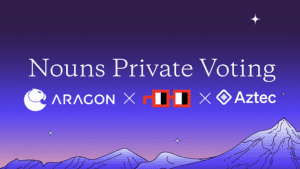Up to 100x cheaper than Ethereum with privacy built in — now live on testnet!

Today we’re excited to announce the next step in Aztec’s vision for privacy and scaling on Ethereum: Aztec Connect.
Aztec Connect allows users to confidentially access world-class DeFi services on Ethereum with up to 100x cost savings, all while strengthening Aztec’s existing privacy guarantees.
In March, we launched zk.money, our private payments protocol. It demonstrates how Aztec’s privacy architecture can enable simple asset transfers, allowing users to privately send $DAI, $ETH, and $renBTC.
Aztec Connect is a giant leap ahead: users can now bridge private assets to mainnet for a DeFi interaction and return to Aztec in the same transaction. For the first time ever, it’s now possible to interact cheaply and privately with any Ethereum DeFi application.
And it’s live on testnet.
Connect is a privacy and scalability module for money markets, DEXes, liquid staking pools, derivatives, and everything else Ethereum builders dream of. It also interacts directly with Layer 1 liquidity and contracts, meaning no fragmentation or core contract redeployment.
Welcome to the new age of Ethereum, where transactions are affordable and private by default.
Aztec: Origins
Aztec was founded to solve financial privacy.
However, given limitations at the time in zero knowledge proving architecture, the first version of Aztec had trade-offs that restricted user privacy, even while preserving transaction confidentiality.
The road to Aztec Connect involved inventing the now industry-standard PLONK proving system, which not only added user privacy but offered significant performance improvements, accelerating Aztec 1’s speed and throughput.
These improvements led to the deployment of the world’s first private rollup, offering private payments with immeasurably better privacy and gas fees 25x cheaper than privacy mixers.
Since deploying on mainnet, Aztec has welcomed over 20,000 users who have made $38 million+ in deposits.
We are now ready to unveil Aztec Connect, the next phase in our journey.
Aztec Connect: Gateway to Private DeFi
Aztec Connect serves as a bridge to Ethereum, allowing users to bring privacy-shielded zk-assets on Aztec to public DeFi protocols on Ethereum.
As a result, users save 80–90% on gas fees with privacy thrown in for free.
Users deposit funds into Aztec’s Layer 1 rollup contract, and privacy-shielded notes are minted by the Aztec system, identified by their zk- prefixes (e.g. zkETH and zkDAI).
Previously, functionality and usability of zk-assets was limited to internal-to-Aztec private sends and private withdrawals to Ethereum L1 addresses.
Now, users can do any DeFi transaction supported by an Aztec Connect Bridge Contract — a 50 to 100-line interface allowing Aztec’s roll-up to interact with a given Layer 1 smart contract.
Here’s how it works in a pretty animation:

Once users decide on a DeFi transaction, Aztec batches transactions up with other transactions of the same type and passes them to an Aztec Bridge Contract.
The Bridge Contract then takes the aggregated funds and calls the relevant functions from a DeFi protocol, returning proceeds from the interaction to the rollup contract. Finally, Aztec updates its state tree and in the process gives users on the network their share of funds as shielded notes.
Aztec Connect acts as a proxy acting on behalf of users within Aztec who want to execute a DeFi transaction on Layer 1.
If you need further help anthropomorphizing the rollup, or need help imagining a proxy, I’ve got you! Here are a few famous ones:
- Brooke Lampley from Sotheby’s — the eminently meme-able proxy bidder for ConstitutionDAO’s effort to buy the U.S. Constitution:

2. Tank, the operator from The Matrix:

Brooke represented a community of 17,000 depositors looking to execute one transaction (“buy the constitution”) and outbid Ken Griffin, megawhale CEO of Citadel.
Tank represented a fictional community of real-world humans attempting to overthrow hyper intelligent computer agent overlords who enslaved humanity in a scheme to extract body heat as an energy source.
An Aztec Connect Bridge Contract represents a batch of Ethereum users who want a given DeFi transaction in a given rollup.
See the similarities?
These three entities have a lot in common:
- They’re heroes who help the small guy fight powerful entrenched interests.
- They bridge people from one reality to another.
- They make sure the interests of the people they represent are faithfully communicated across domains.
Now of course, Aztec’s Bridge Contracts are completely private, deterministic and secured by zero-knowledge proofs! They can’t ever betray users intent.
A Simple Example: Connect to Swap
How does this translate to practical cost-savings? Let’s talk through a basic Uniswap swap, which costs ~130,000 gas ($55.64).¹
Because the Aztec rollup supports large batch sizes — up to 896 transactions at launch, courtesy of Flashbots (more on this in a later post) — the cost of validating Aztec zero-knowledge proofs is amortized across many users.
You can think of this as the cost of privacy. At current proof construction costs, the cost of privacy is just 1,875 gas per transaction.
Say 100 users want to execute the same swap on Uni. Splitting the cost of the Uniswap transaction and cost of posting data on Ethereum, they each pay 15,762 gas.
In total, the cost of a Uniswap transaction becomes just 17,637 gas, or $7.52, an 86% savings over L1. Swaps become 7.4x cheaper, with iron-clad privacy as a bonus.
Aztec Connect vastly expands Aztec Network’s capabilities at launch, adding whitelisted DeFi functionality with select partners. Any developer looking to integrate Aztec to an existing DeFi application can write an Aztec Connect Bridge Contract.
Soon thereafter, the Connect SDK will allow developers to integrate affordable private transactions directly into their front-ends, making Aztec accessible straight from the DeFi experiences you love.
Permissionless, programmable privacy on Ethereum.
The No-Brainer Case for Projects
Integrating with Aztec Connect is simple, straightforward, and secure. A basic 50–100 line Bridge Contract helps Layer 1 smart contracts interface with Aztec’s rollup.
Bridge Contracts translate batch transaction requests for DeFi interactions from the Aztec rollup into function calls that DeFi protocols understand.
Due to its simplicity and robustness, integrating with Aztec has significant benefits over other scalability solutions:
- Full privacy for users.
- No liquidity fragmentation — all liquidity stays on Layer 1.
- 80–90% cost savings over Ethereum for simple transactions, and up to 99% (100x improvement) for complex transactions.
- No redeployment of core contracts — just the 50–100 line bridge contract.
In March, we brought privacy to $ETH, $DAI, and $renBTC with zk.money.
Aztec Connect extends privacy to all of Ethereum.
Buidl The Future of Ethereum
Aztec connect is now live in Alpha on testnet and we are welcoming developers to check out the starter kit for building Bridge Contracts and contact us to whitelist contracts for testing here:
Aztec Grants Program: https://airtable.com/shrvglCZ24jaH73oe
Connect Starter: https://github.com/AztecProtocol/aztec-connect-starter.
Whether you’re a protocol developer or a weekend warrior interested in giving your favorite DeFi app 10x cost savings with privacy built-in, join us.
Help make privacy a no-brainer.

Join the Aztec Community
We’re always on the lookout for talented engineers and applied cryptographers. If joining our mission to bring scalable privacy to Ethereum excites you — check out our open roles.
And continue the conversation with us on Discord or Twitter.
- While basic swaps cost 110,000 gas, a typical Uniswap trade is multi-hop: that is, the Uniswap protocol optimizes trade routing for slippage, which means the trade routes through a couple liquidity pools to fulfill the order. Hence a more typical trade cost of ~130,000 gas.
![]()
Private DeFi with the Aztec Connect Bridge was originally published in Aztec on Medium, where people are continuing the conversation by highlighting and responding to this story.





